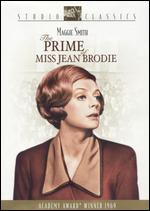 As announced in our opening class, Thursday's lecture will, in addition to the notorious John Knox treatise on women and regnancy, begin our engagement with Muriel Spark's The Prime of Miss Jean Brodie. Spark is as much a poet as a novelist, and the succintness of this novel is a function of its poetic substance: stunningly telescoped meanings; deep evocation from the briefest of passages; echoes and re-echoes of a cadence one half seen; the other half felt.
As announced in our opening class, Thursday's lecture will, in addition to the notorious John Knox treatise on women and regnancy, begin our engagement with Muriel Spark's The Prime of Miss Jean Brodie. Spark is as much a poet as a novelist, and the succintness of this novel is a function of its poetic substance: stunningly telescoped meanings; deep evocation from the briefest of passages; echoes and re-echoes of a cadence one half seen; the other half felt.Your first reading won't take long at all. As with all first readings, read solely for pleasure, and reflect when compleated what the primary character, or characters, or central object, might have represented. Always keep in mind Dr. Johnson's famous warrant for reading without looking at, or, pertinent to us, taking, notes:
Notes are often necessary, but they are necessary evils. Let him, that is yet unacquainted with [the book at hand] .... read every [work] .... from the first .... to the last, with utter negligence of all his commentators. When his [i.e. the reader's] fancy is once on the wing, let it not stoop at correction or explanation. When his attention is strongly engaged, let it disdain alike to turn aside to the name of
Theobald and of Pope [i.e. any commentator, no matter how famous]. Let him read on through brightness and obscurity, through integrity and corruption; let him preserve his comprehension of the dialogue and his interest in the fable. And when the pleasures of novelty have ceased, let him attempt exactness, and read the commentators.
Particular passages are cleared by notes, but the general effect of the work is weakened. The mind is refrigerated by interruption; the thoughts are diverted from the principal subject; the reader is weary, he suspects not why; and at last throws away the book, which he has too diligently studied.

No comments:
Post a Comment